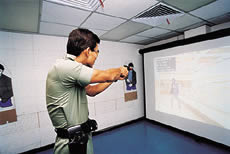|
Personnel and Training
Personnel
Wing
Key
Resources
The
key resource of the Force is its people, its individual men and women,
regardless of rank. From frontline beat constables to civilian backroom
computer technicians, the Force comprises a team of highly trained and
motivated people who work and respond as one.
The latest techniques in human resources management are employed to ensure
cohesion in all aspects of staff relations, welfare, promotion, discipline
and conditions of service. Our
Human Resources Programme provides the framework to constantly improve
procedures. We have set up a centralised unit to deal with serious or
complicated disciplinary cases, and introduced more transparency in the
promotion process to demonstrate fairness. The recently revised Junior
Police Officer (JPO) promotion system has been well received by these
officers. Meanwhile, we have developed a competency-based performance
management system for the rank of Superintendent, which will be extended
to the other ranks in turn.
Recruitment
During
the year, we established a Police Recruitment Homepage on the internet
that provides potential applicants with a broad range of information on a
career in the Force. Those interested are encouraged to visit recruitment
offices where they can discuss various aspects of police life. The
challenges, structured promotion path and competitive remuneration package
ensure that applications far outnumber available posts and that recruits
are of a high calibre. Only 254 of the 7 773 Police Constable (PC)
applicants and 20 of the 1 640 Inspector applicants were eventually
recruited. Of the PCs recruited, 126 had tertiary level educational
qualifications.
Consultation
Good
staff relations and an effective consultative system are of paramount
importance to the efficient and effective management of a Force that
contains more than 28 000 disciplined officers. Four channels have been
established to maintain an open dialogue :
|

Shooting
ranges utilising hi-tech digitial imagery simulate life- threatening
situations to test officers' reactions and marksmanship.
|
- The
Staff Relations Group acts as a conduit for the receipt and
dissemination of information between the management and staff, and
vice versa. In addition to its established consultative mechanism, the
Group also holds monthly informal meetings with the Staff
Associations, called Staff Relations Clinics, to address topical
issues of staff concern. Where appropriate, subject officers of
relevant lead departments brief the meetings to help instil a better
understanding and obtain feedback on these matters. The overall
purpose is to further enhance internal communication in an informal
and focused manner.
- Consultative
Councils deal with the issues of pay, welfare and conditions
of service.
- The
Police Force Council (PFC), chaired by the Commissioner, is a
forum for discussion between senior management, the Administration and
representatives of the four police staff associations ¡X the
Superintendents' Association (SPA), the Overseas Inspectors'
Association (OIA), the Local Inspectors' Association (LIA) and the
Junior Police Officers' Association (JPOA).
- Both
the Senior Consultative Council (SCC) and the Junior
Consultative Council (JCC) are chaired by the Director of
Personnel & Training (DPT). The two Councils deal with issues
falling within the direct authority of DPT, particularly those
affecting welfare and conditions of service. The SPA, LIA and OIA sit
on the SCC whereas the JPOA sits on the JCC to give their views on the
issues discussed.
The PFC, SCC and JCC each meet at least three times per year.
Conditions
of Service
Reduction
in Working Hours
Following
a successful trial period, Force working hours were reduced from 51 to 48
hours per week in January 2000.
Re-Employment
on Contract
JPOs
who joined the Force before April 1, 1995 and are serving on permanent and
pensionable terms of service may choose to retire early (between 45 and 50
years of age) and apply for re-employment on contract terms. Since this
involves changes in conditions of service, regular seminars are conducted
to explain the complex issues involved. |